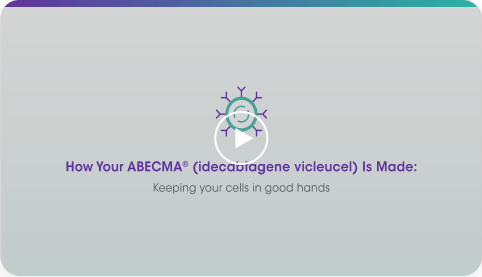What is ABECMA? ABECMA (idecabtagene vicleucel) is a prescription medicine for the treatment of multiple myeloma in patients who have received at least three kinds of treatment regimens that have not worked or have stopped working. ABECMA is a medicine made from your own white blood cells; the cells are genetically modified to recognize and attack your multiple myeloma cells.


This website is best viewed using the horizontal display on your tablet device.

This website is best viewed using the vertical display on your mobile device.
In a clinical study of 30.9 months follow-up (median), people treated with ABECMA lived longer without the disease getting worse or passing away, 13.8 months vs 4.4 months with standard treatments.
*Median is the middle number in a group of numbers arranged from lowest to highest.
CAR=chimeric antigen receptor.
What to expect during the ABECMA treatment process
Overview of the 3 steps to treatment
Step 1: Before treatment

Blood collection (apheresis):
Your T cells will be collected through a process called apheresis
(sometimes called leukapheresis).
- Your blood is drawn and the components separated into groups. Your T cells are collected and other parts of your blood are returned back into your body
- Apheresis can be done on Day 1 as an outpatient, and usually takes 2 to 6 hours
Time: 2-6 hours
Location: Certified treatment or apheresis center

CAR T cell creation:
After your T cells are collected, they are sent to a specialized manufacturing laboratory.
- At the laboratory, “hooks” called CARs are added to your T cells to make the ABECMA CAR T cells that are unique to you
- After your ABECMA CAR T cells are made, they are multiplied to make more multiple myeloma–fighting cells. This takes about 4 weeks
Time: About 4 weeks (time may vary)
Location: Specialized manufacturing laboratory
There is a risk that the manufacturing process may not work. In an ABECMA clinical study, 6 out of 249 people were impacted.
Talk with your doctor for more information.

Pre-infusion treatment:
- Before your infusion, you’ll receive a 3-day short-course chemotherapy to help prepare
your body for ABECMA - While your CAR T cells are being made, you may receive other treatments for the multiple myeloma
Time: 3 days of short-course chemotherapy
Location: Treatment is given at the center by appointment
Step 2: Treatment day

One-time ABECMA infusion*:
You will receive your one-time ABECMA infusion at a certified treatment center from your trained healthcare team.
- Your dose of ABECMA may be given in 1 or more infusion bags
- Your infusion usually takes up to 30 minutes for each infusion bag
Time: Up to 30 minutes per infusion bag (1 or more)
Location: Certified treatment center (Day 1 of 1-week hospital stay)
*The treatment process includes blood collection, CAR T cell creation, administration, and adverse event monitoring.
Step 3: After treatment

Initial monitoring:
In the weeks following your ABECMA infusion, you will be monitored for side effects.
For the first 7 days after treatment
Monitoring at the treatment center
- You will stay at the certified treatment center where you got your treatment for at least 7 days after
the infusion to be monitored for side effects
During weeks 2 to 4
- You should plan to stay within 2 hours of the certified treatment center for at least 4 weeks after receiving ABECMA. Your caregiver will keep an eye on how you’re doing and will check and record your temperature at least 3 times a day, and take you to scheduled appointments at the treatment center

Long-term follow-up:
After at least 4 weeks of monitoring
Monitor for side effects and tell your doctor right away if you feel symptoms of cytokine release syndrome or neurologic toxicity
- Do not drive, operate heavy machinery, or do other activities that could be dangerous if you are not mentally alert for at least 8 weeks after you receive ABECMA
You will not require any additional treatment† while
responding to your one-time infusion‡ of ABECMA
†Regular check-ins with your healthcare team are still needed.
‡The treatment process includes blood collection, CAR T cell creation, administration, and adverse event monitoring.
CAR=chimeric antigen receptor.
